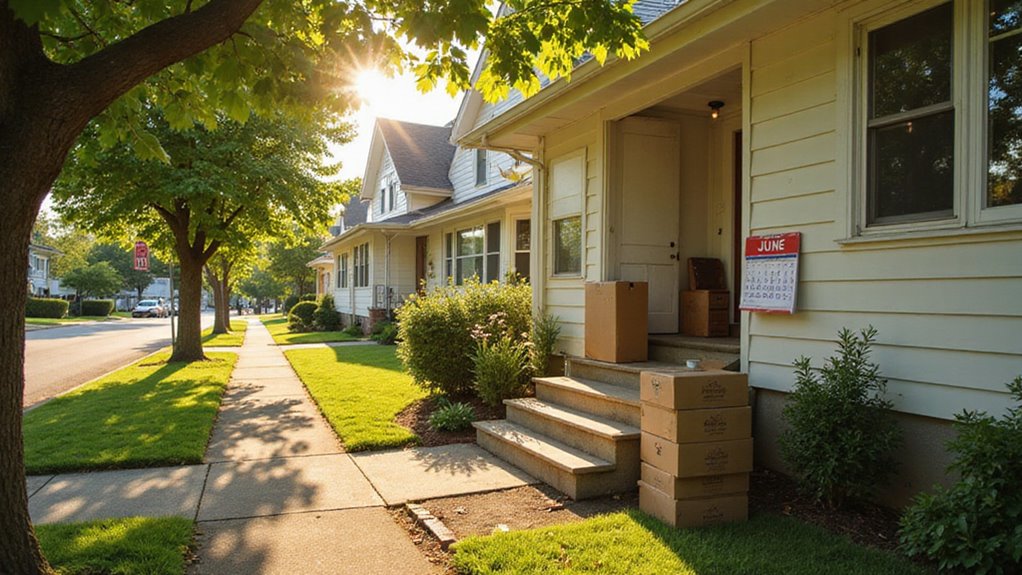Selling a rental property can be tricky. The timing of your sale can change how much money you make and how long your property stays on the market. Many owners wonder when the best time is to sell for the highest price and fastest results.
Choosing the wrong time can mean fewer buyers, lower offers, and more stress. Local market trends, tenant leases, and even school schedules can affect your decision. If you don’t plan well, you might lose money or face delays. The best time of year to sell a rental property is usually in spring or early summer, when buyer demand peaks.
You should also consider your local market and your tenants’ situations before listing. A smart strategy will help you get the best outcome. This blog will give you clear steps to pick the best time to sell your rental property.
Key Takeaways
- Spring is generally the best time to sell, with peak buyer demand and homes selling faster and at higher prices.
- Listing between April and June can result in 5–10% higher sale prices for rental properties.
- Summer offers high demand, quick sales, and attracts serious buyers, especially families moving before the new school year.
- Fall can be advantageous due to less competition and more motivated buyers, leading to potentially quicker sales.
- Winter is usually the slowest season, with fewer buyers, longer sale times, and reduced negotiation power for sellers.
Understanding Seasonal Real Estate Trends

Seasonal trends have a strong impact on real estate. Certain times of year are better for selling rental properties. Sellers can benefit from higher prices and faster sales during these periods.
Buyer demand and property prices change with the seasons. Inventory levels also shift throughout the year. These changes affect when it is best to sell or show a rental property. If you work with a family-owned local business, you can take advantage of their expertise in navigating market timing.
Well-maintained homes stand out more in busy selling seasons. If you prepare your property before peak months, you may get better offers. The timing of lease renewals and tenant screening often matches these seasonal trends.
If you study past sales and local patterns, you can spot the best times to sell. This can help you avoid long vacancies and maximize your profits. Planning your sale around these cycles can give you a clear advantage.
Working with local North County, MO buyers who know the market can help you time your sale for the best results.
How Spring Impacts Property Sales
When you list your rental property in spring, you’ll benefit from a surge in buyer activity—historically, home sales spike by as much as 40% compared to winter months. Your property’s curb appeal also peaks as landscaping and natural light showcase it at its best. Market data consistently shows that spring brings higher sale prices and shorter days on market, making it a strategic season to sell.
If you’re considering selling to cash home buyers, spring’s increased buyer pool can lead to even faster and more competitive cash offers. Selling in spring is especially advantageous if you are considering as-is home sale options, since increased buyer demand can help offset the typical price reductions associated with properties sold in their current condition.
Increased Buyer Activity
Spring sees more buyers looking for rental properties. The National Association of Realtors reports home sales rise by almost 40% in spring. This makes it the busiest season for real estate activity.
Many buyers prefer shopping in spring due to good weather and the school year ending. Vacation homes are in high demand as people want to buy before the summer rental season starts. Investors may also act now to take advantage of tax deductions for the current year.
If you sell in spring, you can face less competition from other sellers. Higher buyer activity can help you get better prices or terms. Selling during this season often leads to faster and more successful deals.
Enhanced Curb Appeal
Spring increases your property’s curb appeal by making it look more attractive to buyers. Homes with good curb appeal can sell for up to 7% more than similar homes. If you want to stand out, focus on your home’s exterior.
Blooming flowers and green trees make landscaping upgrades more noticeable. Fresh mulch, trimmed hedges, and colorful plants can catch buyers’ eyes. Well-kept yards often lead to a better first impression.
Exterior lighting can highlight your home’s best features if you install it. Lighting also lets people view your home later in the day. If safety is a concern, lighting can help make your property feel secure.
When inventory is low and buyers are eager, curb appeal matters even more. A memorable exterior can make your home sell faster. Investing in your home’s curb appeal could pay off if you plan to sell in spring.
Favorable Market Trends
Spring is the best season for selling rental properties. Homes listed in spring usually sell faster and at higher prices. This happens because more buyers are looking during this time.
If you want to sell to vacation or luxury buyers, spring is especially good. Demand increases as buyers want to close before summer. Resort and high-end areas benefit the most from this trend.
Inventory rises in spring, but competition among buyers keeps prices strong. Many buyers are motivated to move or buy a seasonal home. Listing your property in spring could help you get better offers and more interest.
The Advantages of Selling in Summer
Selling your rental property in summer gives you clear advantages. Buyer demand is higher, and more people are searching for homes. Properties often sell faster in this season.
Many families want to move before the new school year starts. Summer weather makes homes look better, encouraging more visits and offers. Longer daylight helps buyers see properties after work. If you want to avoid hidden fees or commissions, selling in summer with a trusted local buyer can simplify your transaction.
If you want to get the best price, summer is a good choice. Buyers are motivated to settle before fall holidays. Listing during this time can help you attract serious buyers and secure a quick sale.
You can also benefit from a fast, effortless process when selling in summer, as local experts can provide a fair cash offer within 24 hours and close on your timeline.
Fall Market Opportunities for Sellers

Fall is a good time for sellers because there are fewer homes for sale. Buyers are still active and often more serious. This can lead to quicker sales and better prices. Sellers who want an effortless selling process can benefit from fall’s less competitive market and take advantage of buyers who need to move quickly.
Some buyers need to move for jobs or want to settle before the holidays. Sellers can take advantage of these motivated buyers. If you list in fall, you avoid the busy spring market.
A fall sale gives new owners time to get ready for the next rental season. They can also handle any rental rules or paperwork more easily. Staying updated on local property laws helps keep the process smooth. Sellers should also consider capital gains tax rules when timing their sale, as meeting certain requirements can help maximize their profits and minimize taxes.
Challenges of Listing a Rental in Winter
When you list a rental in winter, you’ll face reduced buyer activity—historically, home sales drop by up to 25% compared to spring. Snow and gloomy weather can also limit curb appeal, making it harder to attract interest. Plus, coordinating showings with tenants during the holiday season often leads to more scheduling conflicts and less cooperation.
If your rental property contains asbestos materials, you’ll also need to prepare for additional disclosure and documentation requirements, which can further complicate the selling process during the slower winter market. Working with local investors who buy homes as-is can help you avoid some of these winter-specific challenges and make the process much more straightforward.
Reduced Buyer Activity
Winter makes selling a rental property harder because fewer buyers are looking for homes. This lower demand reduces your chances of finding a qualified buyer. If buyer activity drops, your property may stay on the market longer.
Fewer showings can lead to less competition among buyers. If buyers have more options, they may offer lower prices. Sellers may also lose negotiation power during winter months.
Rental properties often face more urgent maintenance issues in winter. Higher repair costs can reduce your profits if the sale takes longer. Buyers may also check tenant screening and lease agreements more carefully.
If buyers are more cautious, deals may take longer to close. Sellers should prepare for slower market activity and increased maintenance needs. Careful planning can help reduce these challenges.
Curb Appeal Limitations
Winter limits your property’s curb appeal. Snow, ice, and dead plants make homes look less attractive. If buyers see a dull yard, they may lose interest quickly.
Curb appeal can impact a home’s price by up to 7%, according to the National Association of Realtors. Lawns turn brown, and gardens stop blooming during winter. If you want to attract buyers, you must find ways to improve the exterior.
Exterior maintenance gets harder in winter. Property owners must remove snow, clear ice, and keep gutters clean. If you skip these tasks, buyers may worry about ongoing problems.
Tenant Cooperation Issues
Tenant cooperation is a common problem when selling during winter. Tenants may not want frequent showings or inspections in colder months. This can slow down the selling process.
Low tenant turnover in winter means fewer empty units. If tenants stay, it is harder to show the property to buyers. Limited access can reduce buyer interest.
Lease negotiations may stall because tenants do not want to move. If you offer incentives, such as lower rent, tenants might cooperate. Weigh incentive costs against possible sale delays before deciding.
Analyzing Local Market Conditions
Before listing your rental property, learn about local market conditions. Knowing these details helps you get the best sale price. Research gives you a clear idea of when to sell.
Check recent sales in your area to see price trends. Look at average days properties stay on the market. If prices are rising, it may be a good time to list. If your property is being sold through a land contract, you should review the agreement for any restrictions before listing.
Monitor recent sales and market trends in your area—rising prices and shorter listing times could signal the ideal moment to sell.
If your area is popular for vacation rentals, watch occupancy rates and seasonal demand. High demand during certain months can increase your sale price. Seasonal trends may affect how quickly your property sells.
Watch for new developments or projects nearby. New roads, shops, or offices often make properties more valuable. If large projects are planned, property values may go up.
Compare your neighborhood’s data to city or regional averages. This helps you know if you are in a seller’s market. Use reports from local real estate agencies and sites like Zillow or Redfin for up-to-date information.
Before selling, it’s also important to consider legal obligations such as disclosure requirements, which can have a direct impact on the selling process in your area.
Considering Tenant Lease Expirations

Lease expiration dates directly affect how and when you can sell your rental property. Buyers usually prefer homes without tenants so they can move in or choose their own renters. If you plan your sale to match the lease ending, you attract more interested buyers.
You can increase your property’s value by having responsible tenants in place. A month-to-month lease gives you more flexibility to adjust to market changes. Fixed-term leases limit your options if you need to sell quickly. In some cases, co-ownership agreements can impact your ability to sell, especially if more than one person is listed on the deed.
Notice periods required by law can delay or speed up your sale. Seasonal demand also matters for timing your listing. If you coordinate lease terms with market trends, you may reduce vacancies and get a better price.
If you need to sell your house without an agent, you can often simplify the process and avoid extra fees by timing your sale with the end of a tenant’s lease.
Tax Implications and Year-End Strategies
Selling your rental property affects your taxes based on when you sell. If you hold the property for more than a year, you pay lower long-term capital gains tax. Selling near year-end can delay your tax payment to the next year.
You can use this extra time to plan or reinvest your money. If you want to do a 1031 exchange, closing late in the year gives you more time to find a new property. Always check your full financial situation before you sell.
Strategic timing can help increase your profit after taxes. Make sure to consider all costs and tax effects before making a decision. Consult a tax advisor to get advice for your specific case. If you want to avoid agent fees or commissions, selling to a local cash buyer can help you keep more of your profits.
Economic Factors That Affect Buyer Demand

You’ll want to watch key economic indicators like interest rate fluctuations, job market stability, and inflation when timing your sale. Higher interest rates often shrink buyer pools, while strong employment numbers can boost demand. By assessing these trends, you can better predict when buyers are most motivated and able to act.
Interest Rate Fluctuations
Interest rate changes affect how many people can afford to buy homes. If rates go up, fewer people can qualify for loans. If rates go down, more buyers can afford homes and want to buy.
Falling interest rates usually increase buyer demand for your rental property. Rising rates often lower demand and can reduce home values. Stable or low rates help keep buyer interest strong.
If rates are unstable or change often, buyers may wait before making decisions. You should watch rate trends before listing your property. Selling when rates are low or stable may help you get more offers and a higher sale price.
Employment Market Trends
High employment rates often lead to more people wanting to buy homes. Job growth gives buyers the financial support to purchase property. If jobs are stable, you may see more demand for your rental property.
You should watch local job openings and unemployment numbers before selling. If employment is strong, buyer interest is usually higher. Selling during good economic times can help you get a better price.
Regions with steady job creation often see more home purchases. Buyers feel safer making big investments when their jobs are secure. Analyze local job trends to decide the best time to list your property.
Inflation Impact Assessment
Inflation directly affects the real estate market in several ways. It can change how many people want to buy or rent homes. Buyers and sellers should watch inflation trends to make informed decisions.
Higher inflation can lead to higher mortgage rates. This often makes it harder for some people to afford a home. If mortgage rates rise, demand for buying homes may fall.
A strong rental market may benefit from inflation. More people could choose to rent instead of buy, making rents go up. Property owners may see their property values increase as a result.
Investors often see real estate as a safe option during inflation. If you own income-generating property, you might attract more interest from buyers. Selling at the right time could be easier if demand stays high.
Always check local data on rent prices, property values, and interest rates. If inflation spikes, buyer priorities can quickly change. Careful analysis will help you decide if it’s a good time to act or wait.
Evaluating Interest Rate Movements

Interest rates affect both buyer demand and your property’s value. You should watch interest rate changes before selling a rental property. Lower or steady rates usually attract more buyers and higher offers.
If interest rates go up quickly, fewer buyers might enter the market. This can make your property harder to sell and may lower your price. You could wait for better rates if selling conditions are poor.
Check updates from the Federal Reserve and other trusted sources. Historical data and forecasts can help you choose the best time to sell. Staying informed can help you get a better return on your investment.
Aligning With School Calendars and Family Moves
Many families move during summer to avoid disrupting their children’s schooling. If you sell your rental property at this time, you may attract more buyers. The school calendar can strongly affect demand.
Home sales usually peak from May to August. Families want an easy transition before the new school year starts. Listing your property during this period can increase your chances of a quick sale.
If your property is near vacation homes, you might see more interest around school breaks. Some buyers prefer to move during holidays or extended weekends. This could bring another opportunity to sell.
Selling during high-demand months may help you get a better price. A higher sale price can sometimes help offset rental property taxes. You should consider timing your sale to match peak demand for the best results.
Assessing Property Condition and Curb Appeal by Season
The condition of your property and its curb appeal affect buyer interest and sale price. Seasonal changes can make your property look better or worse. Spring and early summer often show off gardens and natural light, which can increase value.
If your rental needs updates, plan repairs before the busy season. Fresh paint or small fixes in late winter help the home stand out in spring. Homes with strong curb appeal may sell faster and for up to 7% more.
You should match any cosmetic improvements with the best season. This approach helps you get better appraisal results and impress more buyers. Proper timing of updates can make a big difference in your sale.
Working With Real Estate Professionals for Timing
Working with real estate professionals helps you choose the best time to sell your rental property. They study the market and local trends to guide your timing. If you want to avoid mistakes, you should follow their advice.
Experienced agents check buyer demand and inventory cycles in your area. They suggest when to make upgrades so your property is ready for busy selling seasons. If you complete renovations at the right time, you may get higher offers.
Real estate professionals use marketing strategies that fit the season. They can increase your property’s visibility during popular months. If you want a faster sale, you should use their expertise.
Their advice can help you avoid timing errors and get better results. If you listen to them, you can take advantage of market opportunities.
Using Data and Analytics to Pinpoint Optimal Sale Months
You’ll make smarter decisions when you track seasonal price fluctuations, market inventory trends, and buyer demand patterns. Data shows that certain months consistently yield higher sale prices and faster transactions. By analyzing these analytics, you can pinpoint the optimal time to list your rental property for maximum return.
Seasonal Price Fluctuations
Seasonal price fluctuations affect when you should sell your rental property. Home prices usually rise in late spring and early summer. If you want the best price, consider selling during these months.
Properties with luxury upgrades or near popular amenities can sell for more at this time. Homes listed between April and June often sell faster. They also get 5–10% higher prices than homes listed in winter.
If you use these seasonal trends, you can earn more from your sale. Timing your sale well also means your property spends less time on the market. Consider these factors carefully before listing your rental.
Market Inventory Trends
Market inventory trends help you choose the best time to sell your rental property. These trends show when fewer homes are for sale. If you sell during low inventory, your property may get more attention.
Local listing data lets you see which months have fewer homes on the market. Spring and early summer often have fewer listings. If you want better offers, consider selling during these times.
Property managers use these trends to help clients make smart decisions. You can look at past data to plan your sale. Using local analytics can improve your selling strategy and return on investment.
Buyer Demand Patterns
Buyer demand is highest in late spring and early summer. Most buyers search for homes from April to June. Listing your rental property during these months can help you get a better price.
Families often want to move before a new school year begins. Vacation plans also increase buyer interest in early summer. If you want to sell quickly, consider these peak months.
Demand usually drops in late fall and winter. Holidays and travel keep buyers distracted during this time. If you list your property then, you may get fewer offers.
You should check local market trends before choosing a listing date. If data shows high demand, it is a good time to sell. Listing when demand is strong can help you sell faster and for more money.
Conclusion
If you want to sell your rental property, timing makes a big difference. Spring and early summer usually bring the most buyers and the best offers. If you list in fall or winter, you might wait longer and get less money.
If you need to sell quickly or want a simple process, consider selling for cash. We buy houses for cash, which removes the stress of waiting for the right buyer or worrying about repairs.
If you are ready to sell or want to learn more, reach out to us at Freedom Path Investors. We can help you get a fair offer and close on your schedule. Contact us today to start your smooth selling process.







